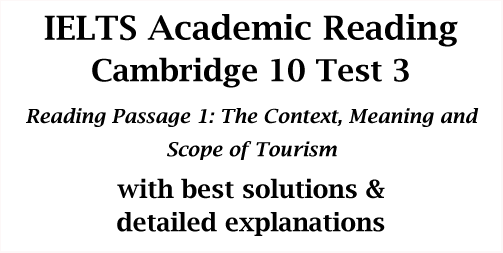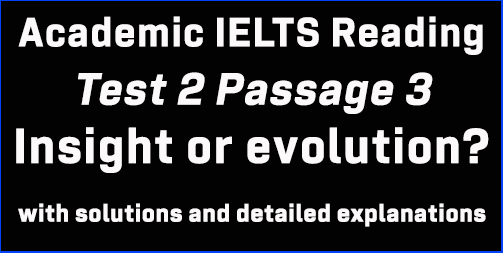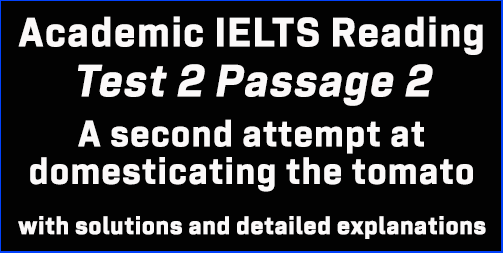IELTS Academic Reading: Cambridge 10 Test 3; Reading passage 1; The Context, Meaning and Scope of Tourism; with best solutions and explanations
This IELTS Academic Reading post focuses on all the solutions for IELTS Cambridge 10 Reading Test 3 Passage 1 which is entitled The Context, Meaning and Scope of Tourism. This is a solution post for candidates who have big difficulties in finding Reading Answers. This post can direct you the best to comprehend every Reading answer easily. Finding IELTS Reading answers is a gradual process and I hope this post can help you in this respect.

IELTS Cambridge 10 Test 3: AC Reading Module
Reading Passage 1:
The headline of the passage: The Context, Meaning and Scope of Tourism
Questions 1-7: (List of Headings)
[To find answers for List of Headings, check the first and (occasionally) the last few lines of each paragraph. Most of the time, the answer is there for you containing some synonymous words, which have a match with the lists of headings. If you cannot find the answers in the first and last few lines, you may need to check the middle of the paragraphs. This we did in other tests too.]
Question 1: Paragraph B
In the first line of Paragraph B the author talks about tourism. Then in the second line, the author says, “.. .. Historians suggest that the advent of mass tourism began in England during the industrial revolution with the rise of the middle class and the availability of relatively inexpensive transportation.” Then the author talks about the creation of commercial airline industry…. . And then, “… .. This growth led to the development of a major new industry: tourism.”
So, the answer is: ii (The development of mass tourism)
Question 2: Paragraph C
Read only the first line of paragraph C. “Tourism today has grown significantly in both economic and social importance.” This first line is the main idea of the whole paragraph.
So, the answer is: i (Economic and social significance of tourism)
Question 3: Paragraph D
Again, we should read the first lines which provide us with the main idea. “However, the major problems of the travel and tourism industry that have hidden, or obscured, its economic impact are the diversity and fragmentation of the industry itself “. It means it has become difficult to recognise (hidden/obscured) the economic impacts of tourism.
So, the answer is: v (Difficulty in recognising the economic effects of tourism)
Question 4: Paragraph E
Read lines 3-5 where the author says, “…. .. . . suggests that tourism has become the largest commodity in international trade for many nations and, for a significant number of other countries, it ranks second or third.” Then, he shows some examples. So, the lines show the impact of tourism worldwide.
So, the answer is: vii (The world impact of tourism)
Questions 5-10: TRUE, FALSE, NOT GIVEN
In this type of question, candidates are asked to find out whether:
The statement in the question matches with the account in the text- TRUE
The statement in the question contradicts the account in the text- FALSE
The statement in the question has no clear connection with the account in the text- NOT GIVEN
[For this type of question, you can divide each statement into three independent pieces and make your way through with the answer.]
Question 5: The largest employment figures in the world are found in the travel and tourism industry.
Keywords for the question: largest employment figures, travel and tourism industry
For this question, we have to look at figures of employment. So, we need to find out words like ‘employment’, ‘employee’, ‘employer’ etc. In paragraph C, the author says in lines 9-10, “The travel and tourism industry is the world’s largest employer with almost 130 million jobs, or almost 7 percent of all employees.”
So, the answer is: TRUE
Question 6: Tourism contributes over six per cent of the Australian gross national product.
Keywords for the question: tourism, over six per cent, Australian, gross, national, product
There is no mention of the Australian gross national product or Australia in the passage.
So, the answer is: NOT GIVEN
Question 7: Tourism has a social impact because it promotes recreation.
Keywords for the question: tourism, social impact, promotes recreation
We can find the mention of the ‘social impact’ of tourism in paragraph C. However, the paragraph has no clue about whether or not tourism has a social impact because of its promotion of recreation.
So, the answer is: NOT GIVEN
Question 8: Two main features of the travel and tourism industry make its economic significance difficult to ascertain.
Keywords for the question: two main features, economic significance, difficult to ascertain
Look closely at paragraph D. The first lines say, “However, the major problems of the travel and tourism industry that have hidden, or obscured, its economic impact are the diversity and fragmentation of the industry itself.”
The lines mean that two main features of the travel and tourism industry (diversity and fragmentation) have hidden, or obscured (make difficult to ascertain) its economic significance.
So, the answer is: TRUE
Question 9: Visitor spending is always greater than the spending of residents in tourist areas.
Keywords for this question: visitor spending, greater, resident spending
We find a mention of ‘spending by visitors’ in line 7 of paragraph D. However, this paragraph does not give us any specific information about any comparison of visitor spending and resident spending.
So, the answer is: NOT GIVEN
Question 10: It is easy to show statistically how tourism affects individual economies.
Keywords for this question: easy to show, statistically, tourism affect economies.
In paragraph E, take a look at the last of the paragraph. “However, because of problems of definition, which directly affect the statistical measurement, it is not possible with any degree of certainty to provide precise, valid or reliable data about the extent of world-wide tourism participation or its economic impact.”
The lines mean it is not so easy (it is not possible with any degree of certainty) to present statistically (statistical measurement) the impact of tourism.
So, the answer is: FALSE
Questions 11-13 :(Completing sentences with NO MORE THAN THREE WORDS):
[In this type of question, candidates are asked to write no more than three words to complete sentences on the given topic. For this type of question, first, skim the passage to find the keywords in the paragraph concerned with the answer, and then scan to find the exact word/words.]
Question 11: In Greece, tourism is the most important ___________.
Keywords for this question: Greece, most important
We find the mention of Greece in the last paragraph (paragraph E), lines 5-6: “For example, tourism is the major source of income in Bermuda, Greece, Italy, Spain, Switzerland and most Caribbean countries.”
Here, major means most important.
So, the answer is: source of income
Question 12: The travel and tourism industry in Jamaica is the major ___________.
Keywords for this question: Jamaica, the major
In paragraph E, look at lines 8-10, where the author says, “…… suggest that the travel and tourism industry is the number one ranked employer in the Bahamas, Brazil, Canada, France, (the former) West Germany, Hong Kong, Italy, Jamaica, Japan, Singapore, the United Kingdom, and the United States.”
Here, number one ranked means major.
So, the answer is: employer
Question 13: The problems associated with measuring international tourism are often reflected in the measurement of __________.
Keywords for this question: problems, measuring international tourism, often reflected, measurement,
Have a look at the last lines of paragraph E, “However, because of problems of definition, which directly affect statistical measurement, it is not possible with any degree of certainty to provide precise, valid, or reliable data about the extent of world-wide tourism participation or its economic impact. In many cases, similar difficulties arise when attempts are made to measure domestic tourism.”
Here, similar difficulties arise means reflected.
So, the answer is: domestic tourism
Click here for solutions to Cambridge 10 Test 3 Reading Passage 2
Click here for solutions to Cambridge 10 Test 3 Reading Passage 3




in question 7 ,the answer could be False since last sentence in paragraph C says “and because of the educative effect… on society itself”so it means tourism makes educative influence on social life. in my opinion, the word “educative” is opposite to the word” recreation”. that’s why it is false